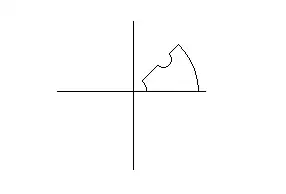In my complex analysis exam, i met an aweful integration:
Integrate $$\int_0^\infty \frac{\log x}{x^b-1}dx,\ b>1.$$
It has two types of singularities; $x=0$ gives a singularity for $\log x$, and the roots of $x^b-1=0$ give singularities for $\frac{1}{x^b-1}$. Hence I choose argument from $0$ to $2\pi/b$, and I tried to integrate it along the contour
$$\begin{align*}
C_1(t)&=t, \varepsilon\le t\le R,\\
C_2(t)&=Re^{it}, 0\le t\le \frac{2\pi}{b},\\
C_3(t)&=(R-t)e^{2\pi i/b}, 0\le t\le R-(1+\varepsilon'),\\
C_4(t)&=e^{2\pi i/b}+\varepsilon'e^{2\pi i/b-it}, 0\le t\le \pi,\\
C_5(t)&=((1-\varepsilon')-t)e^{2\pi i/b}, 0\le t\le 1-\varepsilon'-\varepsilon,\\
C_6(t)&=\varepsilon e^{2\pi i/b-it}, 0\le t\le \frac{2\pi}{b}.
\end{align*}$$

In the closed contour, it has no residues, and hence the integral along the contour becomes $0$. The integral along $C_2$ and $C_6$ goes to zero. In doing this, I am stuck in integrating $C_3$, $C_4$, and $C_5$;
By taking limits for $\varepsilon$ and $R$, it has no problem, but there is a problem about taking limit for $\varepsilon'$. Along $C_3$, $C_4$, and $C_5$, the integral becomes $$\int_R^{1+\varepsilon'}\frac{\ln t+2\pi i/b}{t^b-1}dt+\int_0^\pi \frac{\log(e^{2\pi i /b}+\varepsilon'e^{2\pi i/b-it})}{(e^{2\pi i /b}+\varepsilon'e^{2\pi i/b-it})^b -1}(-i)\varepsilon'e^{2\pi i/b-it}dt+\int_{1-\varepsilon'}^\varepsilon\frac{\ln t+2\pi i/b}{t^b-1}dt$$ and it seems that by taking $\varepsilon'\to0$, the integral $$\int_R^{1}\frac{2\pi i/b}{t^b-1}dt+\int_1^\varepsilon\frac{2\pi i/b}{t^b-1}dt$$ DOES NOT converges.
In the second summand, it converges to $\frac{2\pi^2}{b^2}$, and Wolframalpha says that the entire integral converges to $\displaystyle\frac{\pi^2\csc^2(\pi/b)}{b^2}$.
Here are my summarized questions:
- Is there anything wrong in choosing contours?
- How to calculate the integral near $z=e^{2\pi i/b}$?